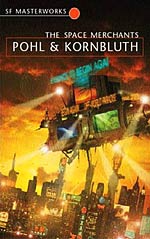
![]() BigEnk
BigEnk
10/27/2024
![]()
A classic from the post WWII era that perhaps has lost a lot of its charm in the ensuing 80 years since. Nevertheless, The Space Merchants displays the archetype of a capitalistic hellscape that many writers would borrow from for a long time.
Here, advertising is king, and the top firms operate what amounts to their own fiefdoms, more powerful than government or God. Our main character is one of top executives at one of these firms, and as such has all of the privileges that make his life in this world (where fresh water, clean air, square footage, and real meat) are luxuries that few can ever hope to afford. His position is thrown into flux when his firm settles on trying to populate Venus for their own benefit through the standard set of morally gray and reprehensible tactics, and when they put him in charge of the operation. The other large advertising firm doesn't take too kindly to this, and doesn't hesitate to use bureaucratic assassination, which is legal. This is to say nothing of the 'Consies', or conservationists, who are deemed as a terrorist organization, but seem to be the only group who is fighting to end the capitalist system, and fight for the unwashed, proletariat masses, or as their know here: consumers.
Since The Space Merchants was written by two authors, there's an unevenness to both the quality and tone of the writing that made it hard to get settled into the text. The section that was mostly written by Kornbluth, when Courtenay is cast off into a low-level consumer job, tends to be pretty decent. Kornbluth writes with a darker, biting style in comparison to Pohl's sections that were mostly colored by his insistence on smarmy sarcasm. The satire on display is sometimes good, sometimes heavy-handed. Neither writer blew me away, but Kornbluth certainly seems a cut above a lot of his golden age SF peers. I enjoyed the creativity and animosity he showed.
Honestly, this just feels pretty forgettable to me. Sure, there are standouts. I really enjoyed the word-building. I enjoyed seeing this dystopia from both sides of the divide in such a detailed way. It's admirable that there are many terms used today that were coined here first (sucker-trap, R & D, muzak). But beyond these few bright spots, I can't point to anything I cared for all that much. The characters were either cardboard or grating. The choice to not only write women dreadfully, but also the depiction of the character who happened to be a little person was, I think even at the time it was written, hopelessly offensive. The plot moves along okay, but too much time is spend dawdling on a love interest that can't possibly be engaging to anyone other than a 14 year old boy.
Glad to have read it in a completionist sense, but if you're just looking to just read something good, I'd skip this one.